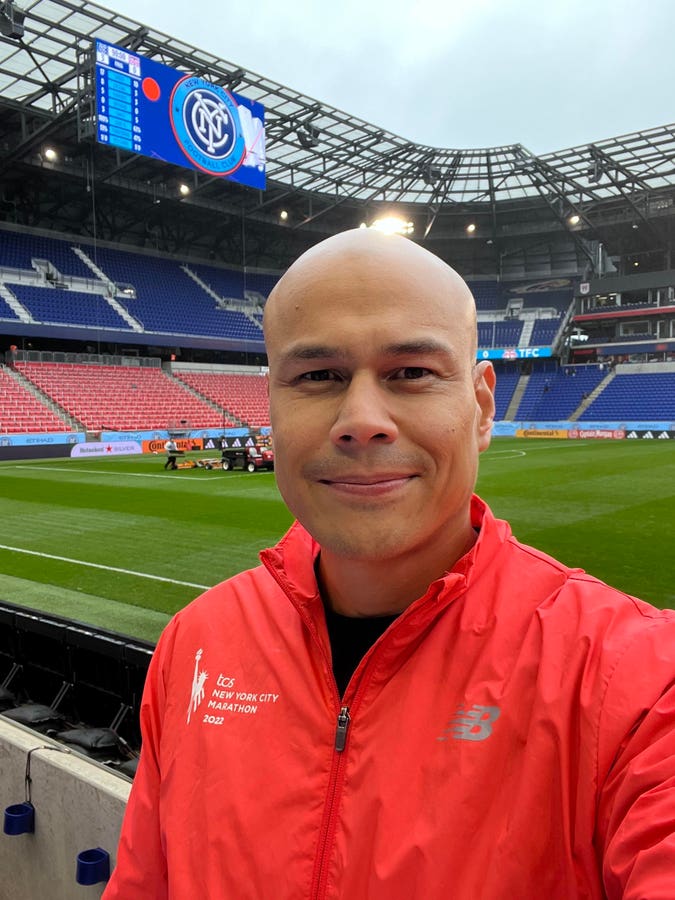On July 1, 2024, Montefiore Einstein launched its new Sports Mental Health & Performance Institute. Dr. Jorge Aguilar, M.D., Ph.D., a child, adolescent, and adult sports psychiatrist, is the new director of the institute, bringing a wealth of experience from his roles as the team psychiatrist for the New York City FC in Major League Soccer (MLS) and a consultant to Major League Baseball (MLB) in mental health and performance.
A Vision for Athlete Mental Health
Dr. Aguilar’s career trajectory has been shaped by his dynamic educational background and deep passion for sports psychiatry. After earning his MD and PhD at the Albert Einstein College of Medicine in NYC, he started pediatric residency at the Children’s Hospital of Philadelphia, where he quickly realized his true calling was in psychiatry. His subsequent residency and fellowship at Montefiore laid the groundwork for his interest in sports psychiatry and mental skills training. During his training, he was mentored by Dr. Jonathan Fader, licensed performance psychologist, at SportStrata. Throughout his time at SportStrata, where he still works part-time today, he received extensive training and supervision, contributing to his expertise in this sub-specialty of psychiatry. Outside his direct clinical care, Dr. Aguilar serves on the Certifications and Partnerships committee for the American Board of Sports & Performance Psychiatry.
“I strongly believe in the importance of mental health services, as do athletes and coaches. It’s an important part of them being the best versions of themselves, yet the utilization rates are lower than what the epidemiological data says that they should be,” says Dr. Aguilar. This new Institute aims to address barriers that prevent athletes from seeking mental health services, such as stigma, availability, and cost, making specialized mental health services more accessible to athletes.
Comprehensive Services for Athletes
At this time, the Institute is staffed by Dr. Aguilar, as he supports athletes at all levels and provides treatment for concerns like performance anxiety, recovery from injury, and general mental health concerns in athletes. He has plans to expand by hiring additional mental health practitioners, emphasizing the importance of specialized services for this population. He looks forward to providing education to future psychiatrist and psychologist trainees at the institute, increasing the standard of athlete mental health care.
“We are about 2 weeks into the institute being open, and we are already providing services to professional athletes and high school athletes,” says Dr. Aguilar. Not only is he focused on clinical care, but he also aims to expand research, in collaboration with other departments, as well as increase mental health awareness in the community.
Dr. Aguilar’s past work with professional athletes has significantly informed his program development with the new institute. “When a college or high school athlete hears that we have a sports psychiatrist who works with professional teams, they’re more likely to say yes to the services,” he explains. This credibility is enhanced by the hospital’s affiliations with MLS’s New York City FC and the New York Yankees, positioning the new institute as a trusted resource for athletes seeking mental health support. In addition, the program accepts insurance, expanding its accessibility to the local community.
A Collaborative Effort Inspiring a Broader Impact
The establishment of this institute was a collaborative effort involving Dr. David Gonzalez, Chief Medical Officer of NYC FC and Chief of the Division of Sports Medicine at Montefiore Einstein, Dr. Jonathan Alpert, Chair of Psychiatry at Einstein, and Dr. Philip Ozuah, CEO of Montefiore Medicine. “It’s important for our institute to continue to work with professional athletes because they have a powerful platform to inspire people. When they say it’s ok for them to not be ok, it makes it ok for the rest of us,” says Dr. Aguilar. With the launch of the Sports Mental Health and Performance Institute, Montefiore Einstein is setting the example for prioritizing athlete mental health, breaking down barriers, and promoting athlete well-being.
Read the full article here





